When you’re walking down the street and you see a homeless person, what is your typical response? Perhaps you stop and give a few dollars, or maybe you just keep walking, feeling bad but hoping someone else will help later on. As someone who has done both, I understand the struggle and conflict most of us feel. But in addition to whether or not we decide to act, what are we thinking about that person? That we’re sorry but there’s not much we can do? Why are they homeless in the first place? And, if we’re being honest with ourselves, maybe we’re even thinking that it’s most likely their fault and not our concern.
These were just a few of the questions I encountered at the incredible performance of In the Blood at Krannert Center for the Performing Arts. Directed by Lisa Gaye Dixon, In the Blood is a modern adaptation of Nathaniel Hawthorne’s famous novel The Scarlet Letter. For anyone who hasn’t read The Scarlet Letter, or if the last time you read it was in high school, the story is set in seventeenth century Puritanical Massachusetts, where the main character, Hester Prynne, has a child out of wedlock and is punished by the community by forcing her to wear a red-colored letter A, symbolizing adulteress. The novel focuses on how Hester continues to try to live with dignity despite her disgraced position, and how she refuses to reveal the name of the father to protect him from society’s scorn, even though that means she takes the entirety of the blame.
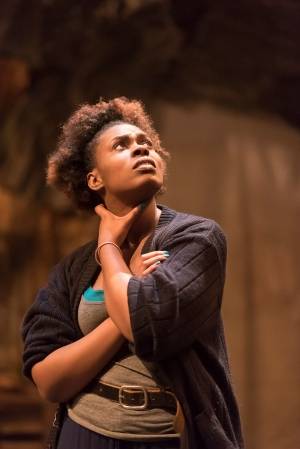 In the Blood follows a similar theme. Set in present time, the play begins by introducing Hester, played by Maya Prentiss, a homeless black woman who has recently had her fifth child, each from a different man. Even from the very beginning, and I thought this was the most important aspect, the play immediately establishes Hester’s humanity and never loses sight of it. I immensely enjoyed how Prentiss played Hester because she skillfully, and often humorously, showed Hester’s fears, desires, hopes, and dreams. Prentiss was able to take the parts of Hester that society would label as “bad” — her homelessness, that she’s a single mother — and show that these were the places where Hester’s strength and humanity really came through.
In the Blood follows a similar theme. Set in present time, the play begins by introducing Hester, played by Maya Prentiss, a homeless black woman who has recently had her fifth child, each from a different man. Even from the very beginning, and I thought this was the most important aspect, the play immediately establishes Hester’s humanity and never loses sight of it. I immensely enjoyed how Prentiss played Hester because she skillfully, and often humorously, showed Hester’s fears, desires, hopes, and dreams. Prentiss was able to take the parts of Hester that society would label as “bad” — her homelessness, that she’s a single mother — and show that these were the places where Hester’s strength and humanity really came through.
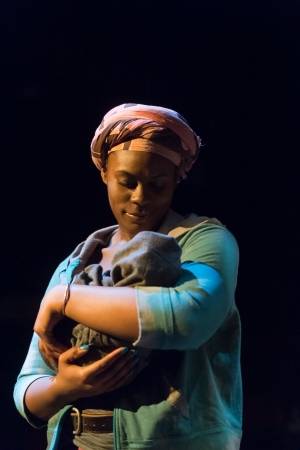 The opening scene shows Hester singing to her newborn baby, and circling around her are the other actors portraying what I took as the various voices of society, each cruelly commenting on Hester’s homelessness, her multiple children, and that she cannot read or write. As the play progresses we see that, despite their homelessness, Hester is always doing her best for her children, often skipping meals and pressing their clothes with two wooden boards in lieu of an iron.
The opening scene shows Hester singing to her newborn baby, and circling around her are the other actors portraying what I took as the various voices of society, each cruelly commenting on Hester’s homelessness, her multiple children, and that she cannot read or write. As the play progresses we see that, despite their homelessness, Hester is always doing her best for her children, often skipping meals and pressing their clothes with two wooden boards in lieu of an iron.
As Hester and her children Trouble, Beauty, Baby, Bully, and Jabber, played by Samuel Babick, Alexis DawTyne, S. Janjay Knowlden, Danyelle Monson, and Christian Wilson, respectively, live as well as they can underneath a main bridge, what is striking is that the people who are supposed to be helping Hester are actually the ones hurting her the most. Hester’s roadside doctor, also played by Samuel Babick, is condescending of Hester’s poverty and her struggle, at one point commenting to Hester that “you and your children live as they please”, as if suggesting that Hester chooses to live as she does. Hester is also vilified for having multiple children, to the point the doctor ends up referring her for a hysterectomy to the “higher ups” without her knowledge, saying that “it’s for the best” for her and her family.
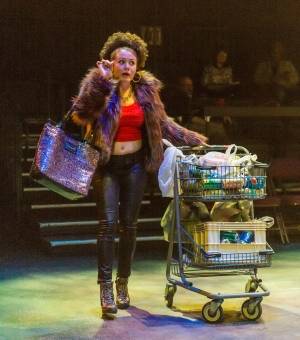 Before I continue, I want to be clear that every day there are amazing agencies and individuals who devote their time, energy, and money to helping the homeless, so Hester’s roadside doctor and welfare agent are not supposed to be representative of the thousands of people who dedicate their lives to helping those who suffer from poverty. But what Hester’s doctor and welfare agent, also played by Danyelle Monson represent is just how hard it can be for people who live in poverty to escape it when they’re dehumanized for their situation. Hester faces backlash by almost every person who comes into her life, even by her one friend Amiga Gringa, also played by Alexis DawTyne. Hester is often forced to take degrading and woefully low-paid jobs so she can feed her kids and pay for basic necessities, but when she does it just fuels the negative way people view and treat her.
Before I continue, I want to be clear that every day there are amazing agencies and individuals who devote their time, energy, and money to helping the homeless, so Hester’s roadside doctor and welfare agent are not supposed to be representative of the thousands of people who dedicate their lives to helping those who suffer from poverty. But what Hester’s doctor and welfare agent, also played by Danyelle Monson represent is just how hard it can be for people who live in poverty to escape it when they’re dehumanized for their situation. Hester faces backlash by almost every person who comes into her life, even by her one friend Amiga Gringa, also played by Alexis DawTyne. Hester is often forced to take degrading and woefully low-paid jobs so she can feed her kids and pay for basic necessities, but when she does it just fuels the negative way people view and treat her.
The question of blame is also explored, particularly when two of Hester’s past lovers reappear. Reverend D., also played by S. Janjay Knowlden, unintentionally reappears in Hester’s life and as she explains her story of how she and her child were abandoned by the father he urges her to go and demand that the father take responsibility, hilariously unaware that he is that very man Hester is appealing to. Once he realizes that it’s him, however, he tries to have nothing to do with her and refuses to support Hester in any way or acknowledge their child.
The father of Hester’s first child Chilli, also played by Christian Wilson, acts in a similar way when, after thirteen years of absence he returns and even proposes. Yet once he realizes that she now has four other children he leaves her again without any offer of support or acceptance of responsibility for their child, and Hester is left to continue to fend for her family on her own.
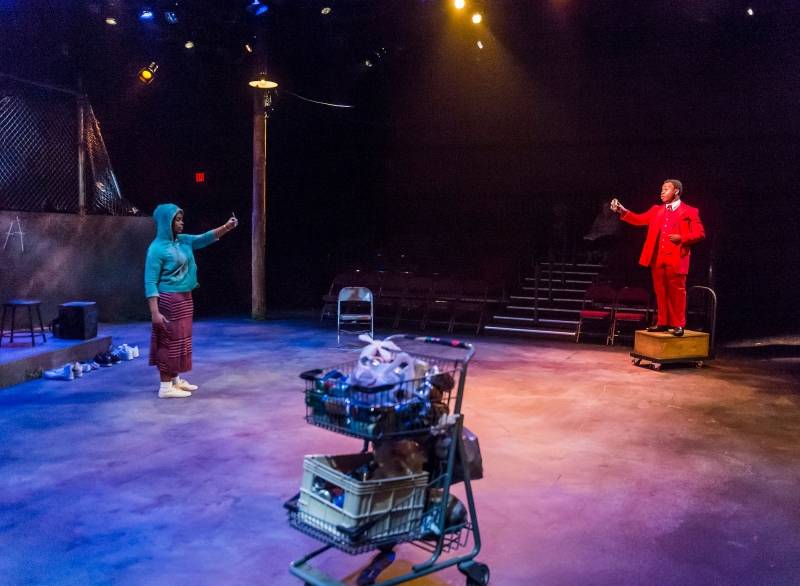
Neither Reverend D. or Chilli ever face any of the incrimination Hester does, and like Hester from The Scarlet Letter she also refuses to give their names to welfare to protect them, even though they refuse to help Hester on their own. This stark unfairness highlights how too often it’s the women for whom the blame and responsibility of a child falls on. At the end of the play Hester comes to recieve money from a collection Reverend D. promised to have in her name. Hester learns he “forgot”, and their confrontation ends with Reverend D. attacking her and yelling “slut” at her while her son Jabber watches. Jabber also begins calling Hester a “slut”, and and in a fit of rage at the continual oppression she faces, Hester loses control, irreparably damaging her family.
I don’t say this often, but In the Blood was one of the best plays I have ever seen. The level of skill each actor had to convey the intensity and complexity of issues concerning race, gender, and poverty was astounding, but even with the moments of deep oppression and inequality there were many times the audience burst out laughing. S. Janjay Knowlden showed the varying emotions of hypocrisy, fear, and moments of humor as Reverend D., and Danyelle Monson and Samuel Babick were able to balance the hardships their characters faced as welfare workers, but also where they failed Hester as a woman and mother in desperate need of help. Alexis DawTyne and Christian Wilson were equally impressive as Amiga Gringa and Chilli, while also keeping in mind that, besides Hester, they all were alternating between playing one of Hester’s children as well as their adult characters.
In the Blood was not a play that wanted you to leave feeling comfortable, but it was in that discomfort questions about decency, humanity, and basic human treatment were asked, as well as where women’s bodily autonomy, race, and poverty intersect. While I didn’t leave feeling like I had all the answers, I was convinced that the only way to improve an unfair and oppressive system is to first fully recognize the humanity of the people in it. So the next time we pass a homeless person on the street we can try and look past our biases, doubts, and fears to the person in front of us and see that, like the rest of us, they’re just another person in need of someone’s help.
In the Blood plays the rest of this week at 7:30 p.m. in the Studio Theatre, beginning tomorrow, Tuesday, April 5th, through Saturday, April 9th, with a matinee at 3 p.m. on Sunday, April 10th. For more information about the show, as well as ticket prices and purchasing options, please visit the event website.
In the Blood contains strong adult content and is for mature audiences only.
If you, or anyone you know is in need for a list of homeles shelters and supportive housing in Champaign please refer to this online list of local resources.
———
All photos taken by Darrell Hoemann, courtesy of KCPA.
About Meghan McCoy…
Meghan is currently a Sophomore undergraduate studying English at the University of Illinois Urbana-Champaign. When she’s not writing for Smile Politely she’s most likely off reading, baking, or doing more writing for her English classes.








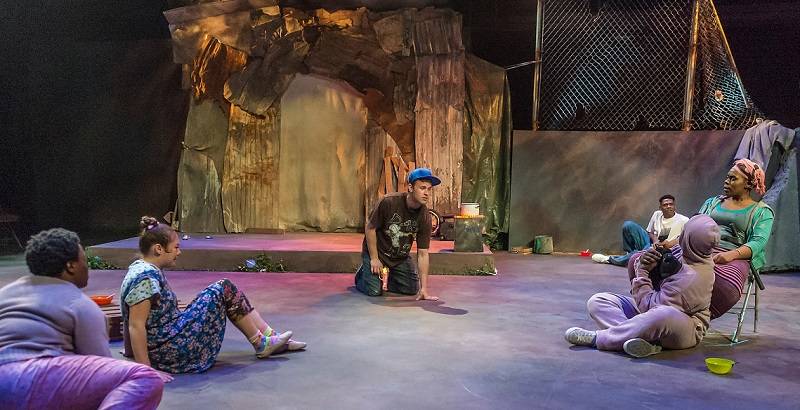
 About Meghan McCoy…
About Meghan McCoy…